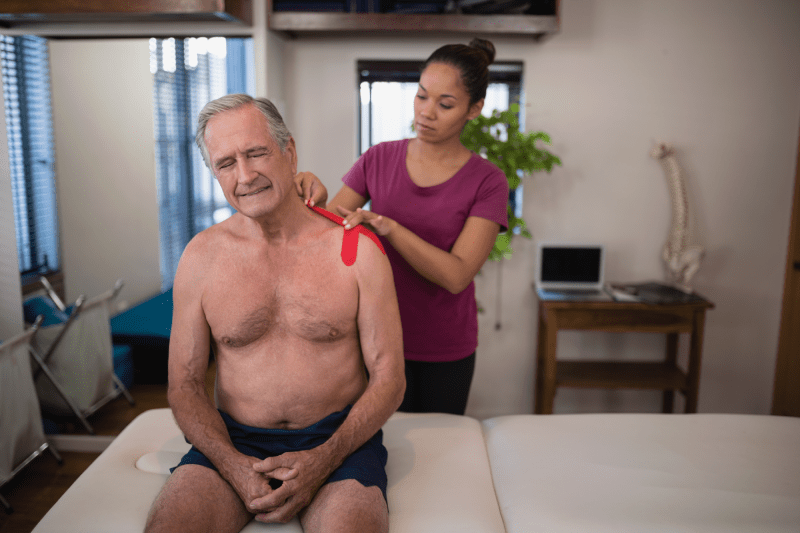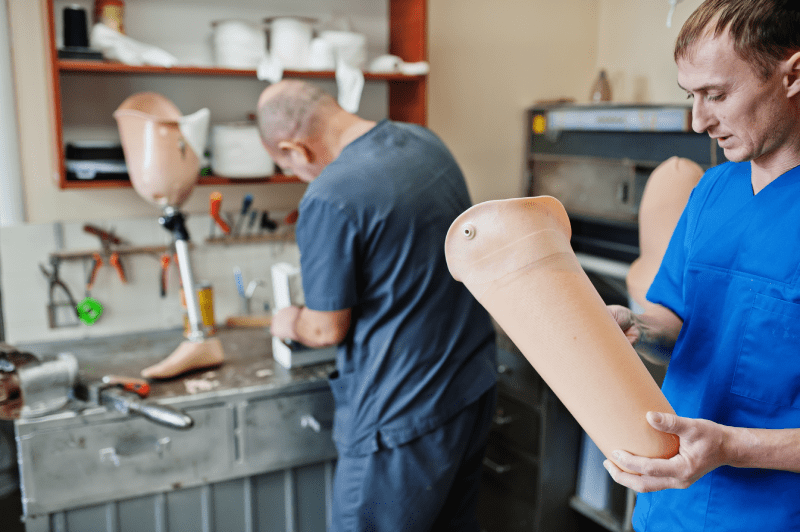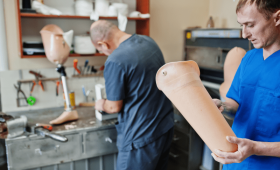What are the Costs of Shoulder Replacement Surgery in Turkey?
The cost of shoulder replacement surgery in Turkey varies depending on many factors. The most important of these factors are the type of prosthesis to be used (traditional or reverse), the experience and reputation of the surgeon performing the operation, the quality of the hospital where the operation will be performed, the level of technological equipment, and the complexity of the operation.
The patient’s additional health problems can also affect the cost. All-inclusive package prices are generally quite competitive and accessible compared to Western countries. However, it is best to contact a clinic or hospital directly to get a definitive price.
What is Included in the Prices?
Hospitals in Turkey generally offer “all-inclusive” packages for international patients. These packages may include the surgery fee, the duration of hospital stay (usually 2-3 days), anesthesia, necessary pre- and post-operative tests, medications, dressing materials, physiotherapy sessions, and airport transfer services. Some packages may also include accommodation services. These packages are prepared to ensure that patients complete their travel and treatment processes smoothly and to prevent unexpected additional costs.
Why is the Cost of the Surgery So Low?
The main reasons why shoulder replacement surgeries are more affordable in Turkey compared to Western countries are the lower general cost of living in the country and the more advantageous exchange rate for foreign patients. In addition, intense competition in the field of health tourism leads clinics and hospitals to offer more competitive prices. This ensures that world-class services are more accessible without compromising on quality. The presence of experienced surgeons and modern medical equipment also reinforces this advantage.
Who is the Most Suitable Candidate for the Surgery?
The most suitable candidate for shoulder replacement surgery is a person who experiences severe pain, limited range of motion, and loss of joint function in the shoulder joint. It is important that the patient’s general health is at a level to withstand the surgery and that there is no infection. Your surgeon will decide which type of prosthesis is most suitable for you based on a physical examination and imaging results (such as X-rays, MRI). This condition is vital for the success of the surgery.
How Long Does the Post-operative Recovery Process Take?
The post-operative recovery process after shoulder replacement surgery varies depending on the surgical technique and the patient’s general health. The hospital stay is usually 2-3 days. It is very important to rest and protect the shoulder for the first few weeks. Physical therapy is the most critical part of the recovery process and usually begins a few days after the surgery. It may take 6-12 months for the arm to return to its normal function and for complete recovery.

How High is the Success Rate of the Surgery?
The success of shoulder replacement surgery depends on the right patient selection and the skill of an experienced surgeon. Traditional shoulder prostheses applied to suitable patients have a success rate of over 90% and largely eliminate pain. Reverse shoulder prostheses, on the other hand, are very successful in restoring the ability to lift the arm in suitable patients, and patient satisfaction is high. Commitment to post-operative physiotherapy directly affects the ultimate success.
What is the Difference Between Traditional and Reverse Shoulder Replacement?
The most fundamental difference between traditional and reverse shoulder prostheses is the type of prosthesis used and the way these prostheses are placed in the shoulder joint. In a traditional prosthesis, the natural ball-and-socket structure of the joint is preserved, while in a reverse prosthesis, this structure is reversed. A traditional prosthesis is ideal for patients with intact rotator cuff muscles, while a reverse prosthesis is ideal for patients with damaged or non-functional rotator cuff muscles.
What Tests are Done Before the Surgery?
Before shoulder replacement surgery, a series of tests are performed to evaluate your general health. These tests generally include a blood test, chest X-ray, EKG, and an MRI or CT scan to get a detailed image of the shoulder. These tests are necessary to determine if you are suitable for the surgery and to minimize potential risks. Most all-inclusive packages cover these tests, so patients do not need to get tested elsewhere.
How Long Should I Stay in Turkey for the Surgery?
You may generally need to stay in Turkey for 1-2 weeks for shoulder replacement surgery. This period covers the surgery, hospital stay, and early-stage physical therapy sessions. Detailed planning with your surgeon before the surgery ensures that your trip goes smoothly. This period will be sufficient for post-operative follow-up and care.
What is the Level of Pain After the Surgery?
Post-operative pain is at its most intense in the first few days after the surgery. However, this pain can be easily controlled with the strong painkillers that your surgeon will prescribe. The pain usually decreases and largely disappears within a few weeks. Regular physical therapy and following the surgeon’s recommendations help the pain subside faster. In the long term, the chronic pain experienced before the surgery disappears.
Why is Post-operative Physiotherapy Important?
Physiotherapy is a vital part of the recovery process after shoulder replacement surgery. A physical therapist determines specific exercises that will help you regain range of motion, rebuild muscle strength, and reduce pain in the operated shoulder. Regular physiotherapy sessions ensure the longevity of the prosthesis and the patient’s return to daily activities.
When is Revision Surgery Necessary?
Revision surgery for a shoulder prosthesis may be necessary in cases where the prosthesis has reached the end of its lifespan, loosened, dislocated, become infected, or when tissue damage has occurred around the prosthesis. Wear and tear of the prosthesis after many years since the first surgery is also a reason for revision. Revision surgeries are more complex and challenging than the first surgery.
What is the Experience Level of Hospitals in Turkey?
Turkey has become an important center for medical tourism and has very experienced surgeons and modern hospitals for shoulder replacement surgery. Turkish surgeons have been trained according to international standards and have performed thousands of successful operations. Before the surgery, it is important to check the surgeon’s experience and references in this field to help you make the right decision.
When Can I Start Driving a Car After the Surgery?
It is generally recommended to wait 6-8 weeks to start driving a car after shoulder replacement surgery. This period is necessary for the shoulder to heal sufficiently and to regain the muscle strength to hold the steering wheel safely. Before you start driving, you should make sure that you can move your arm comfortably and do not feel any pain.
When is it Possible to Travel by Plane After the Surgery?
After shoulder replacement surgery, a surgeon’s approval is generally required to travel by plane. Most patients can travel by plane 1-2 weeks after the surgery. However, it is important to protect the shoulder and not keep it in a fixed position for a long time during the flight. It may be beneficial to drink plenty of fluids and take small walks to increase blood circulation before and during the flight.
Will There Be a Permanent Scar After the Surgery?
It is normal for a surgical scar to remain on the operated shoulder after shoulder replacement surgery. Depending on the type of surgery and the surgeon’s technique, the size and appearance of the scar vary. These scars fade over time and become less noticeable with the healing process. Wound care and sun protection during the healing process help the scars look better.
Are Traditional and Reverse Prosthesis Surgeries the Same Price?
There is usually a cost difference between traditional and reverse shoulder prostheses. A reverse shoulder prosthesis may be more expensive than a traditional one due to the more complex surgical procedure it requires and the more specialized prosthetic material. The reverse prosthesis has a more specialized structure designed to allow the deltoid muscle to move the shoulder, which increases its production cost.
What is the Most Suitable Season for the Surgery?
There is no specific seasonal restriction for shoulder replacement surgery. The surgery can be performed in any season. However, it is important to avoid extreme hot or cold weather conditions during the recovery process. For this reason, spring and autumn months are more often preferred because the temperature and humidity are at ideal levels.
When Can I Start Exercising After the Surgery?
After the surgery, light physical activities (like walking) can be started a few days after the operation. For sports that put a load on the shoulder, such as swimming, golf, or tennis, it is generally necessary to wait 3-6 months. It is recommended to start heavy sports and muscle building after 6 months. These time frames are important for the success of the surgery.
What is the Patient’s Role in the Success of the Surgery?
The patient’s role in the success of the surgery is very large. Strictly following the surgeon’s instructions, not skipping physiotherapy sessions, avoiding strenuous activities, and adopting a healthy lifestyle speed up the recovery process and extend the life of the prosthesis. The patient’s motivation and commitment to the post-operative period determine the quality of the final outcome.
What Should I Pay Attention to in Clothing After the Surgery?
During the recovery process, it is best to wear clothes that are easy to get on and off, such as wide, buttoned or zippered shirts. Since dressing and undressing may be difficult in the first few weeks, it is important to choose practical clothes. Your surgeon will give you specific instructions on how to move the operated arm.
Is a Prosthesis Needed in Cases Without Cartilage Damage?
If there is no cartilage damage but there is pain and limited range of motion in the shoulder, shoulder replacement surgery is usually not the first option. In these cases, less invasive methods such as physical therapy, medication, or shoulder arthroscopy may be preferred. A shoulder prosthesis is generally considered when there is advanced arthritis or irreversible damage to the joint.
Is There an Age Limit for the Surgery?
There is no definitive age limit for shoulder replacement surgery. The decision for surgery is made based on factors such as the patient’s general health, lifestyle, and the degree of damage to the shoulder joint. When applied at a young age, it should be remembered that revision surgery may be necessary when the prosthesis reaches the end of its life. In elderly patients, the operation is performed to improve the quality of life.
What Are the Additional Services for Patients Coming from Abroad?
Additional services offered for patients coming from abroad include not only the surgical packages but also travel and accommodation arrangements. These services include airport pickup, hospital and hotel transfers, translation services, and accommodation arrangements. These services make patients feel safer and more comfortable in a foreign country.
Which is Longer Lasting, a Traditional or a Reverse Prosthesis?
The lifespan of prostheses varies depending on the patient’s lifestyle and activity level. Traditional prostheses are exposed to less stress because the rotator cuff muscles are intact, and therefore they can generally be longer-lasting. Reverse prostheses, on the other hand, may have a higher potential for faster wear because they work with more complex mechanisms. However, both prostheses are designed to last for many years.

Can the Outcome of the Surgery Be Guaranteed?
No surgical operation can be guaranteed 100%. The success of a shoulder replacement surgery depends on many factors such as the surgeon’s experience, the patient’s general health, and their commitment to the rehabilitation process. However, working with an experienced and successful surgeon significantly increases the probability of achieving the desired outcome. Your surgeon will realistically evaluate your expectations before the surgery and provide information about the potential outcomes.
How Long is the Hospital Stay After the Surgery?
The hospital stay after shoulder replacement surgery usually ranges from 2 to 3 days, depending on the type of operation, the patient’s general health, and the rate of recovery. The hospital team will closely monitor you for post-operative pain management, dressing, and the first physiotherapy sessions. The hospital stay is very important for a smooth recovery process.
Are There Risks of Complications After Shoulder Replacement Surgery?
As with any surgical operation, there are some risks associated with shoulder replacement surgery. These risks include infection, bleeding, nerve damage, dislocation or loosening of the prosthesis. However, these risks are quite low thanks to modern surgical techniques and hospital conditions. Working with an experienced surgeon and following the doctor’s instructions after the surgery minimizes the risks.
Are Physiotherapy Sessions Included in the Package Price?
Some “all-inclusive” packages may include a certain number of post-operative physiotherapy sessions. However, this service may not be in all packages. It is important to clarify this detail with the clinic when planning your surgery. Since long-term physiotherapy will be required, it is useful to find out if the cost of these sessions is included in the package to avoid unexpected expenses.
How Should I Prepare Before the Surgery?
Before the surgery, it is vital to follow the instructions given by your surgeon. Stopping the use of blood-thinning medications and herbal supplements, and quitting smoking and alcohol consumption are at the top of these instructions. Having a light breakfast on the morning of the surgery and coming in comfortable clothes will make the process easier. In addition, it is important to prepare the necessary documents for the hospital in advance.
Why is Hospital Selection Important for the Surgery?
Hospital selection is one of the most important factors that directly affect the success of the surgery. Choosing hospitals with international accreditations such as JCI shows that the clinic’s service quality, patient safety, and hygiene standards are at an international level. Hospitals with modern equipment and an experienced staff minimize potential risks after the surgery.
What is the Legal Situation in Turkey?
Turkey has a legal and regulated sector in the field of health tourism. It is completely legal for foreign patients to come to the country for aesthetic or medical operations. The Ministry of Health regularly inspects hospitals and clinics. This ensures that patients receive treatment in a safe environment. However, it is always recommended to work with a reliable intermediary company or clinic.
What is the Long-Term Impact of the Surgery on Quality of Life?
Shoulder replacement surgery significantly increases the quality of life for patients experiencing shoulder pain and loss of function. After a successful surgery, patients can perform their daily activities without pain, their sleep quality improves, and they can return to social life more easily. In the long term, the functionality of the prosthesis positively affects the patient’s overall well-being.
How are Post-operative Check-ups Done?
Post-operative check-ups are generally done at certain intervals in the first few days, one week later (for suture removal or bandage change), and in the following months. Your surgeon will plan these check-ups to monitor your recovery process and to detect possible problems early. For patients coming from abroad, these check-ups can be planned online or with a second visit.


